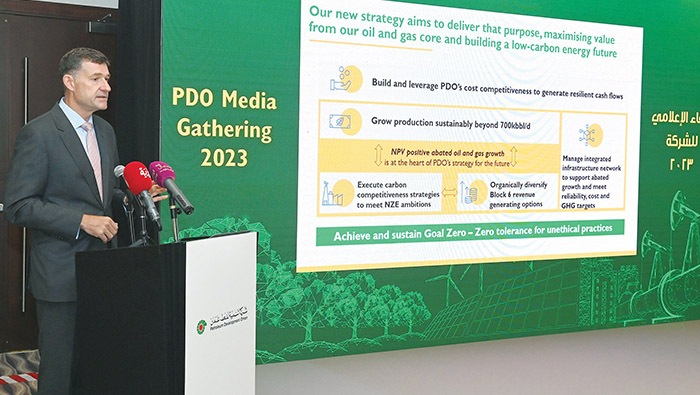
Muscat: Petroleum Development Oman (PDO) has pledged its commitment to a lower-carbon system in the Sultanate of Oman and laid out an orderly transition pathway to achieve the ultimate goal of Net Zero Emission by 2050 (NZE2050).
On Tuesday, PDO Managing Director Steve Phimister admitted that “energy markets still face extreme volatility” but the company is determined to “building a sustainable and low-carbon future to maximise value for Oman.”
The new mantra was unveiled during a media interaction with the PDO’s new ‘corporate purpose and strategy’, outlining how it will continue to serve and deliver value to Oman.
Speaking on the sidelines of the Oman Sustainability Week (OSW), which PDO co-hosted with the Ministry of Energy and Minerals (MEM) for the second consecutive year at the Oman Convention and Exhibition Centre, Phimister said: “The new strategy aims to deliver that
purpose: to fulfil our role in contributing to Oman’s Vision 2040 and Net Zero Emissions 2050.
“We aim to maximise value from our core oil and gas business. PDO is committed to both cost and carbon competitiveness - safely, efficiently and sustainably.”
Phimister spoke on the giant strides made by PDO, since the first concession was awarded in 1937. “We have come a long way and today, Oman has 202 oilfields and nearly 10,000 active wells. We plan to rig new 1,000 wells in the year ahead.”
The PDO chief said that the company aimed to increase its daily production of 660,000 barrels per day to 700,000 barrels per day. Oman’s crude production is currently estimated to be at one million barrels per day.
Under its new strategy, PDO’s decarbonisation roadmap will see the company halve the existing CO2 emissions by 2030.
“The actual carbon emissions of PDO in 2019 were 12 million ton and we brought it down to 10.5 million ton in 2021. Our aspirations are to reduce the CO2 emissions to 6 million ton by 2030 and then go Net Zero by 2050,” said the PDO managing director.
PDO aims to achieve the goals by pioneering the new energy landscape, leading technology deployment, operational excellence, decarbonisation and supply chain development for Oman’s oil and gas industry.
Phimister said: “Oil & Gas has a role in the global energy system for decades to come, but hydrocarbon development must be sustainable. We have a responsibility to sustain the current energy system whilst we build the new (low carbon) energy system. PDO has bold plans to safely increase oil & gas production while at the same time halving its emissions. And PDO is well-positioned, in partnership with others, to build sustainable, low-carbon revenue streams for the future of Oman”
PDO has demonstrated its environmental stewardship by pioneering innumerable sustainability initiatives. It has kept pace with Oman Vision 2040 and the United Nations Sustainable Development Goals, remaining steadfast in its commitment to deliver meaningful Social Investment (SI) programmes aimed at creating sustainable benefits for the Omani society.
The PDO chief said: “PDO has been at the forefront of developing innovative renewable solutions to create new growth opportunities not only for itself but for the benefit of the nation as well. This strategic direction places increased emphasis on leveraging new technologies, boosting collaboration with relevant institutions, and improving overall energy efficiency and water-management processes. The goal is to ensure longevity in a low-carbon world.”
He added: “PDO is a key contributor to the Omani In-Country Value (ICV). Be it Omanisation and employment or social investment, the ICV value retained annually is US$ 1.8 billion and growing.”